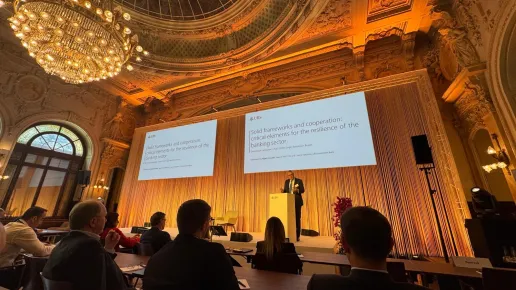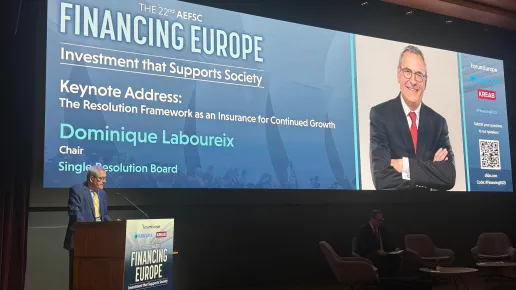[CHECK AGAINST DELIVERY]
[1. Introduction]
Grüss Gott and hello everyone! It is my pleasure to deliver the first keynote speech at today’s FMA supervisory conference. Let me first thank the organisers, with whom I have had excellent collaboration for many years now.
The theme today, ‘Risk, regulation and resilience’, is a very topical and timely one. In a way, it sums up rather neatly what I have experienced so far in my first months as Chair of the Single Resolution.
This morning, I would like to say a few words on each of these concepts in turn, with a view to setting the scene for the panel discussion that comes afterwards.
[2. Risk]
I will start with risk. In recent months, and even years, we have all had to face a changing risk landscape. Some risks have stemmed from the world of finance, such as Archegos and Greensill. Others come from political decisions, such as the UK gilt market turmoil and the Russian aggression in Ukraine. Still others are related to rapidly evolving technology, such as cybersecurity risks or the speed of deposit outflow, as we saw in the US and Swiss banking failures.
What does this mean for us, at the SRB, and many of you with us today from the banking industry? It means a step forward in how we build up and assess our readiness to deal with crisis situations, no matter how they are triggered.
This is a core element of the new Single Resolution Mechanism’s strategy, which will be published in January 2024. We will develop even further our focus on crisis management and readiness, making sure resolution strategies are operational and putting into place comprehensive testing plans, both with banks and in the SRM itself.
We have seen that banks have made good progress in demonstrating that they are resolvable, that a failure can be dealt with in an orderly way, while protecting financial stability and the taxpayer.
Our latest resolvability assessment and heat map shows that banks, on the whole, have built up the financial resources to withstand severe financial stocks, and are on track to meet the necessary targets this year. By the end of 2023, banks are expected to close the main remaining gaps, notably on liquidity and funding in resolution, separability and restructuring.
As you know, loss-absorbing capacity, MREL, is a key element for resolvability. Banks have made good efforts here. We expect the vast majority of banks to reach their final MREL targets by the end of 2023. As a result, the aggregate MREL shortfall across all SRB banks continues to decrease. It reduced significantly in the second quarter of 2023, almost halving compared to the previous one. You can track these figures through the MREL dashboards we publish regularly.
When it comes to funding, we see that market confidence has largely been restored, and last month was strong in terms of issuers being able to tap the market.
In 2023, we broadly maintained our MREL policy, to provide stability to banks in this last year before the final binding target. The SRB will hold a public consultation on its MREL policy for 2024 and beyond later this year.
However, all the good news on resolvability progress does not mean we can all tick the boxes and think that our work is done. The risk landscape does not allow us that type of complacency.
We will continue to ask banks for evidence that they are updating and strengthen their resolvability over time. There will be a testing programme and work on ensuring that resolution strategies can be flexible enough to face different crisis scenarios. Investment of time in information systems is particularly important here, as well as on transfer tools, liquidity in resolution and restructuring.
[3. Regulation]
This brings me to the second concept for this conference: regulation.
Our crisis management and deposit insurance framework is strong and has stood the test of time. However, as we all know, the Banking Union is not complete. The European Commission has brought forward a set of proposals to improve the framework, known as the CMDI review.
I know we will come back to CMDI in the panel discussion, but let me highlight a few key points.
These proposals will not complete the Banking Union, but they are a good step in the right direction, allowing us to better protect depositors and taxpayers at the same time. Put simply, it gives us more options to use should we need them.
The CMDI goes some way towards strengthening the crisis management tool-set, particularly for sales or bridge banks, with a potential use of the DGS to bridge the gap to the 8%, if need be, to access the SRF – the Single Resolution Fund.
The SRB, like the ECB, supports the expansion of resolution in parallel with a more realistic possibility of using deposit guarantee schemes in resolution. We see good arguments for the improvement of an expansion of the public interest assessment and new sources of funding. However, it has to be clear that expanding resolution cannot come without the tools to deal with these additional banks.
Of course, I would like to have seen the CMDI go further, but let us not have perfect being the enemy of the good. We cannot pick and choose which parts of the proposal we would like – it is all interconnected. The CMDI proposal is also made of degrees of other generally small and technical elements, not controversial, which can help authorities before, at the moment and after the crisis. Here my message to the co-legislators is clear: even if you disagree on the funding of the resolution schemes, please agree on all the other measures suggested by the Commission!
[4. Resilience]
I’ve talked about the crisis readiness we need to put in place to deal with current and emerging risks, as well as about the regulatory steps forward being discussed. Finally, let me come to the third concept – resilience.
An important part of resilience is to be able to acknowledge success. We have achieved a lot in the Banking Union, thanks to stronger supervision, the resolution framework and all the work done by banks to meet their requirements and make themselves resolvable.
We have also showed we are able to deal with failing banks effectively, maintaining financial stability and protecting the taxpayer – both in the Banco Popular case and the more recent Sberbank case, which will be familiar to you here in Austria, of course.
We’ve seen that effort pay off though the market turmoil last spring, the Russian war on Ukraine and the Covid pandemic. There was also a generally positive outcome from the European Central Bank and European Banking Authority stress tests over the summer. And, in general, profitability is also good in the sector.
In fact, work on resolvability contributes to resilience in the sector – it’s a virtuous circle that will help us all face any uncertainties that lie ahead.
There are also less tangible aspects to banking sector resilience. To me, trust plays a large role. This is something that can never be taken for granted. It has to be built up together – through sound bank governance, good supervisory work, and, on top of that, a resolution framework that works. Let me add that the sweet spot for building even more trust is combining a predictable system that inspires confidence with the flexibility to respond to the different scenarios and uncertainties we may face.
And trust is also fuelled by good cooperation and communication – including, for example, this excellent event today.
[5. Conclusion]
Ladies and gentlemen, I am drawing to a close. I’ve talked about just a few of the issues that the conference theme has brought to my mind, with the perspective of the Banking Union resolution authority. I look forward to discussing them and other issues in more depth at the panel discussion coming next.
Thank you for your attention.
Contact our communications team
Recent news



Related news and press releases





